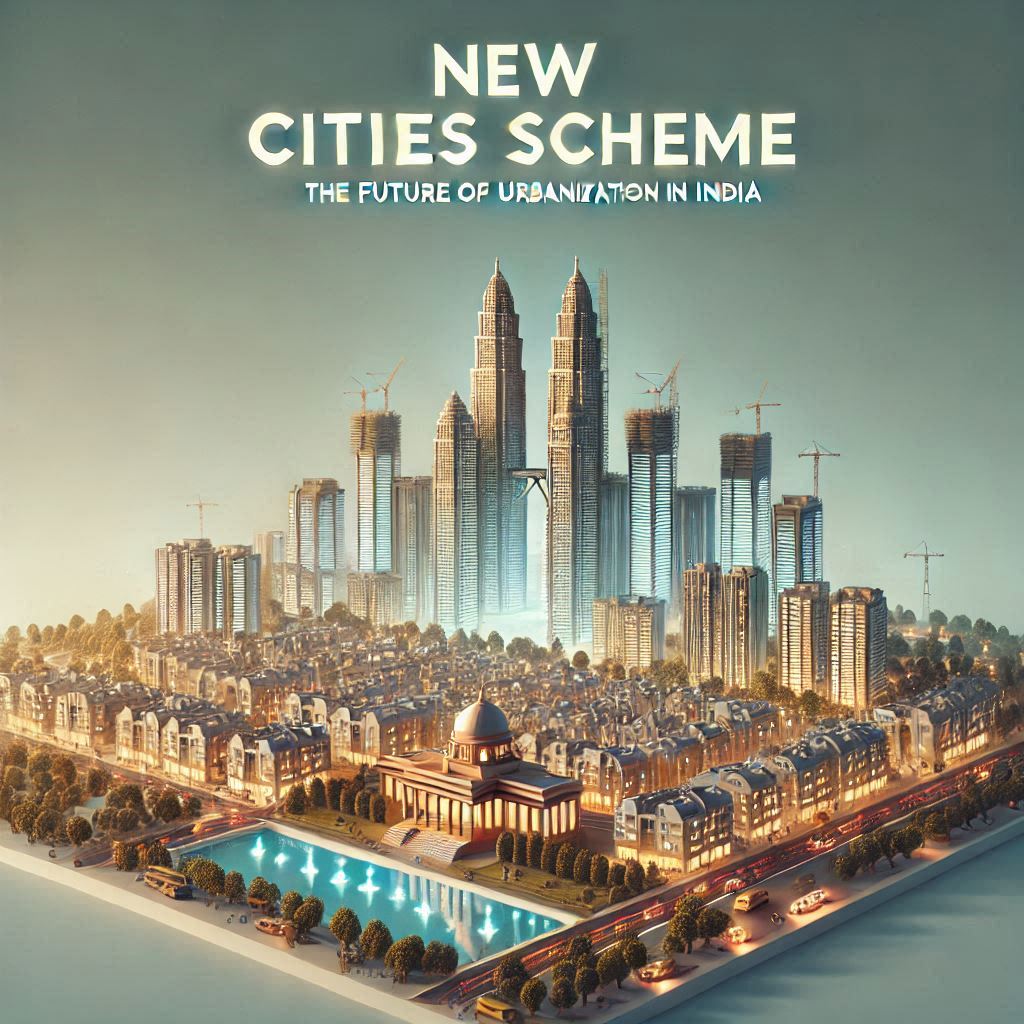New Cities Scheme The Future of Urbanization in India

New Cities Scheme: The Future of Urbanization in India. The Ministry of Housing and Urban Affairs (MoHUA) has introduced a groundbreaking initiative to tackle the growing pressures of urbanization in India. This new scheme, which extends the successful Smart Cities Mission, will focus on the development of eight new cities. With a substantial Rs 8,000 crore allocated for the incubation of these cities, this initiative aims to build urban areas that can handle rapid population growth and modernize infrastructure across the nation.
New Cities Scheme: The Future of Urbanization in India
Key Highlights of the New Cities Scheme
The launch of the New Cities Scheme marks a new phase in urban development. Here’s what you need to know:
- Rs 8,000 Crore for 8 New Cities
- The scheme has earmarked Rs 8,000 crore for the incubation of new cities.
- The fund is performance-based and will be used to develop cities with robust infrastructure and sustainable growth plans.
- Focus on Urbanization and Sustainability
- The new cities will address the challenges posed by urbanization, such as overpopulation, traffic congestion, pollution, and inadequate infrastructure.
- Sustainable development will be at the core of these cities, ensuring they provide a high quality of life for their residents.
- State-Specific Cities
- Each state can nominate one city for inclusion in the scheme.
- The aim is to develop well-planned cities that can accommodate future population growth while offering state-of-the-art infrastructure and services.
Cities Proposed for Inclusion
The Ministry of Housing and Urban Affairs has received proposals for several cities across the country. Below are some of the cities proposed to be included in the new scheme:
- Andhra Pradesh – Kopparthay
- Arunachal Pradesh – Gumin Nagar
- Assam – Jagiroad
- Goa – New MOPA Ayush City, Pernem
- Gujarat – GIFT City Expansion/Ambaji
- Haryana – Gurugram
- Himachal Pradesh – Mountain Township
- Jharkhand – New Ranchi City
- Kerala – Aerocity/OAGC Neopolis
- Madhya Pradesh – Jabalpur Extension/Pithampur Phase 4
- Maharashtra – Virul/Savargaon Mal
- Manipur – Gateway City
- Meghalaya – New Shillong Knowledge City
- Mizoram – Tanhril Local Council
- Nagaland – Chhathe Valley
- Odisha – Bhubaneswar
- Punjab – Aerotropolis
- Rajasthan – GFC-Ranpur
- Sikkim – Pakyong
- Tamil Nadu – Thirumazhisai
- Uttar Pradesh – Ayodhya
- Uttarakhand – Doiwala/Prag Farm Township
- West Bengal – Bantala Greenfield City, Karmadiganta
How the New Cities Scheme Works
The New Cities Scheme follows a structured process to ensure that the selected cities meet specific eligibility criteria and have the potential to grow sustainably. Here’s a look at how the scheme works:
- Expert Committee and Bid Parameters
- An Expert Committee (EC) was formed to finalize the bid parameters for the new cities.
- The committee established minimum eligibility conditions for cities applying for inclusion in the scheme.
- Proposals from States
- The Ministry invited proposals from all states to nominate cities for the scheme.
- A total of 28 proposals from 23 states were received, out of which the most suitable cities will be selected based on their readiness and potential.
- Performance-Based Funding
- The Rs 8,000 crore fund will be allocated to the selected cities based on performance.
- States need to demonstrate their commitment to urban planning, infrastructure development, and sustainability to qualify for the funding.
The Success of the Smart Cities Mission
The Smart Cities Mission, launched earlier, has been a game-changer in urban development. The new cities scheme builds upon the lessons learned from the Smart Cities Mission, which includes the development of 100 cities across India.
Key Achievements of the Smart Cities Mission
- Development of 8,000 Projects
- The 100 cities selected under the Smart Cities Mission are currently developing around 8,000 projects.
- These projects focus on various sectors like smart mobility, water and sanitation, public safety, energy, and economic infrastructure.
- Completion of 91% of Projects
- Over 91% of the projects (worth Rs 1,47,366 crore) have been completed, showcasing the mission’s success.
- Around 714 projects worth Rs 17,303 crore are still under implementation.
- Technological Advancements
- All 100 smart cities now have operational Integrated Command and Control Centers (ICCCs), using data to improve urban management.
- The use of technology has significantly improved urban services, including traffic management, waste disposal, and public safety.
- Improved Public Safety
- More than 83,000 CCTV cameras have been installed in smart cities to monitor crime.
- Over 1,800 emergency call boxes, public address systems, and traffic enforcement systems are enhancing public safety.
- Smart Infrastructure
- The Smart Cities Mission has developed over 9,400 Wi-Fi hotspot locations and 9,400 smart classrooms across government schools.
- Water supply systems in 31 cities are monitored through SCADA systems to prevent leakages and reduce non-revenue water.
- Public-Private Partnerships (PPP)
- Over 50 cities are implementing 199 projects through public-private partnerships worth Rs 9,200 crores.
- This approach has helped ensure greater participation from private players in urban development.
The Way Forward
The New Cities Scheme is a crucial step toward addressing the challenges of rapid urbanization in India. By focusing on sustainability, technology, and infrastructure, the government aims to create cities that are future-ready and can provide a better quality of life to their residents.
As the scheme progresses, it will not only provide economic opportunities but also set new standards for urban planning and governance. The successful execution of the scheme will shape the future of India’s urban landscape, offering solutions to the pressures of growing populations, traffic, and environmental concerns.
Conclusion
The New Cities Scheme is an ambitious plan that builds upon the success of the Smart Cities Mission. With a significant investment of Rs 8,000 crore and a focus on performance-based funding, this initiative has the potential to transform India’s urban areas into modern, sustainable cities. The development of these cities will address the challenges of rapid urbanization and set the stage for the future of urban living in India.
The next step is to monitor the progress of these cities closely, ensuring they meet the desired standards of infrastructure, sustainability, and inclusivity. If executed well, the New Cities Scheme can be a turning point in India’s urbanization journey, creating cities that are smarter, greener, and more livable for all.











